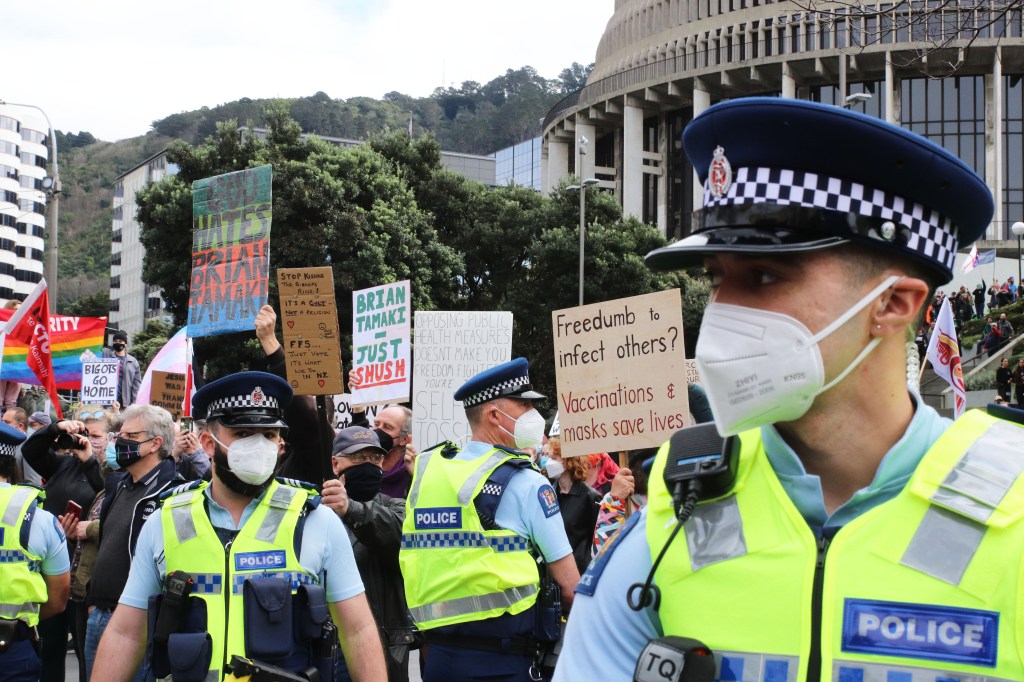Journalists covering ongoing anti-logging protests on southern Vancouver Island say they are repeatedly being blocked and interfered with by police, who have even threatened arrests—so now, newsroom leaders are going to the British Columbia Supreme Court.
In a letter sent to the RCMP, Canada’s federal police force, on Tuesday, the Canadian Association of Journalists (CAJ) and six newsroom leaders said they’ve documented several reports from journalists who’ve been refused entry by police to protest areas.
Videos by VICE
“When granted access, journalists have had that access restricted in ways that materially prevent them from doing their job,” the letter says.
Police interference “is by far the most significant press freedom issue in Canada,” Ricochet Media co-founder Ethan Cox, one of the signatories on the letter, told VICE World News. “Whether it’s malice or incompetence—I don’t know which—it prevents journalists from being able to cover (the protests).”
Since August, activists have been protesting logging of old-growth cedar trees at Fairy Creek, near Port Renfrew, a small community on Vancouver Island. They say the trees are the last unprotected, intact old-growth forest in the area. The blockades have been preventing industry from chopping trees down.
Forest company Teal-Jones Cedar Products, which holds the tree farm licence in the area, says the blockades are making it difficult for the company to access $10 million worth of timber, Global News reported. Last month, B.C. Supreme Court granted the company an injunction, giving the RCMP permission to detain and arrest activists.
RCMP officers started enforcing the injunction last week and have already arrested dozens of protesters. According to the latest Lake Cowichan RCMP press release, police have arrested 53 people—46 for breaching the injunction. But journalists say they’re also being targeted.
Cox said officers corralled media into a pen 150 feet away from ongoing arrests on May 19, making news coverage of the arrests impossible. Then, days later, officers forced reporters to keep 30 to 40 feet away from arrests, he said.
Police have also prevented journalists from accessing raids, or have held journalists at checkpoints, ultimately delaying their arrival at blockades.
On Tuesday, police failed to meet reporters after they promised to do so, and later, threatened to arrest the journalists who complained, Cox said.
The letter asks officers to stop harassing and interfering with journalists, otherwise, CAJ and newsroom leaders will ask the B.C. Supreme Court to amend the injunction so that it explicitly includes protections for the media, like access to the area.
“These are ongoing problems; this is a playbook the RCMP has been using,” Cox said.
Last year, RCMP officers were criticized for interfering with news coverage of Wet’suwet’en land defence against the $6.6 billion Coastal GasLink pipeline, which cuts through Wet’suwet’en territory. CAJ confirmed at the time that police threatened to arrest journalists who were taking photos of or filming officers in tactical gear or those carrying out arrests. The RCMP reportedly detained and removed reporters from blockades.
In 2016, journalist Justin Brake was arrested while reporting on Indigenous land defence in Muskrat Falls hydro dam in Newfoundland. His conviction was overturned in 2019 after Newfoundland Court of Appeal confirmed that even when an injunction is in effect, journalists have the right to do their jobs.
According to Cox, this kind of interference typically happens in isolated areas, often when Indigenous communities are defending their territories. (The current anti-logging protests are taking place on Pacheedaht territory.)
“The national police force is really just acting outside the law and the material effect of that is to compromise the ability of journalists to cover issues of significant public interest,” Cox said. He added that due to RCMP interference, journalists on the ground are only able to collect about half of the information and footage they normally would.
“That’s something that should concern everyone because it’s about the public’s right to know…We are exhausted of having to argue with RCMP every time a story like this happens.”
Follow Anya Zoledziowski on Twitter.
Clarification: A previous version of this story said journalists are threatening to go to court when, in fact, they plan to file by end of day.





